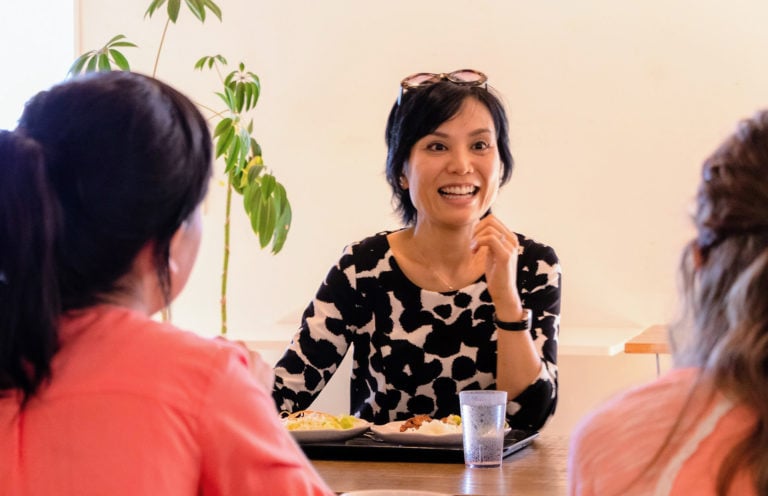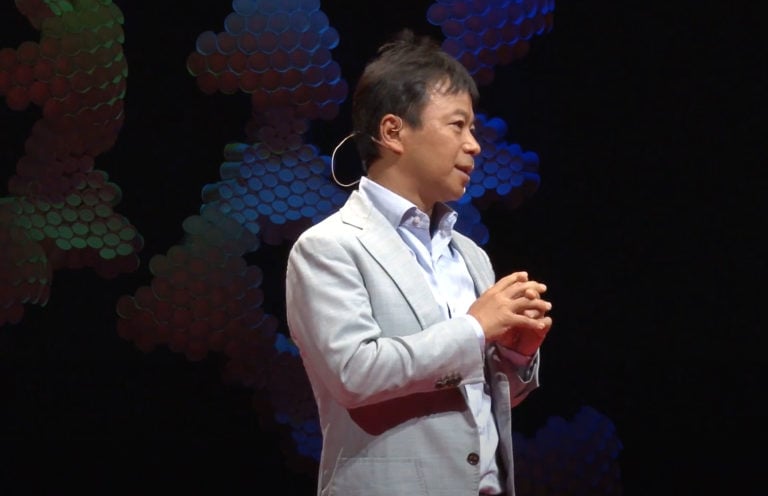For most of our graduates, their well-earned summer break begins the moment the graduation ceremony ends. But for two of our 2021 graduates, it was crunch time, and they were about to embark on one of the most exhausting yet rewarding projects of their lives—they were about to launch their own summer school.
Led on the ground by Mehrimo (Tajikistan / Class of 2021) and her remote project partner Christine (India / Class of 2021), Project Quandeel was only days away from opening the application for Ignite, Tajikistan’s very first-ever English summer camp. The adrenaline from their recent UWC ISAK Japan graduation still lingered. Still, they had to focus on getting everything ready in time for the opening day of Ignite, now only six weeks away.
A call from the mountains of Khorog
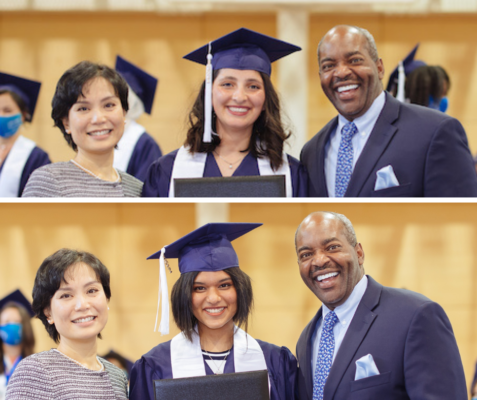
When we spoke with her, Mehrimo was still in her hometown of Khorog in the mountainous region of Pamir, where it all started. She is currently trying to make the initiative more sustainable before flying to Washington State in the US to pursue her bachelor’s degree in Environmental Science and Economics. She is now training volunteers to ensure that Project Quandeel will thrive in her absence.
What is Project Quandeel?
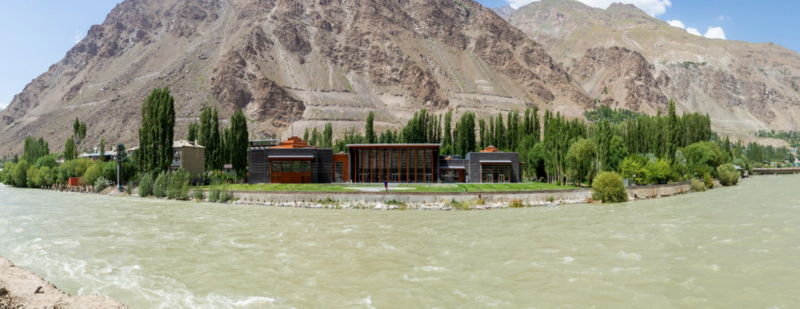
The Ismaili Center in Khorog, where Project Quandeel students gather for classes every weekend.
Last summer, Project Quandeel’s summer camp gathered 25 students from all over Tajikistan at a beautiful sight in the mountains of the Pamir region. Project Quandeel provided money for the 12-hour trip, food, and housing. They trained students in English, Mathematics, and Critical Thinking for ten days. In addition, students participated in a one-hour mandatory university info session, where they learned about different high schools, universities, and exchange programs from the volunteers. Students also gained exposure to an impressive range of activities, including Theatre Club, Dance Club, Chess Club, Creative Writing Club, Debate Club, Human Rights Club, and much more.
Project Quandeel physically started in December 2020 when Mehrimo’s sister printed flyers advertising for Project Quandeel’s weekly English, Mathematics, and University preparation classes. She posted them in the streets of their hometown of Khorog, and students would call Mehrimo’s sister relentlessly to register (Internet access is an issue in Tajikistan) while Christine took charge of the online branding and marketing activities. The weekly 3-hour sessions every Sunday led by volunteers are still ongoing today. They now have an antenna in Dushanbe, the nation’s capital. Some Project Quandeel alumni are currently studying at their dream university, including the prestigious American University of Central Asia.
Seeds of change in an inspiring community
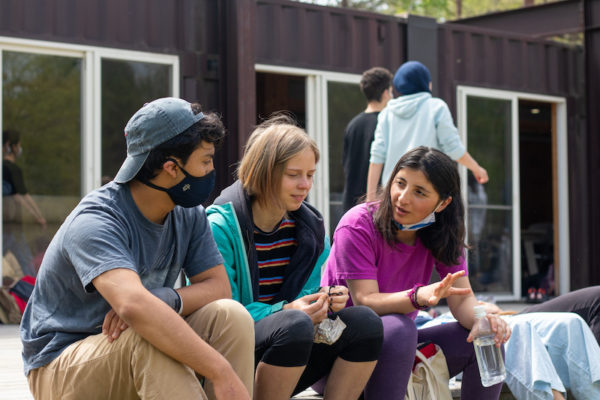
“I came to UWC ISAK Japan on a full scholarship. UWC ISAK Japan allowed me to get the quality education I had always dreamed of. I felt privileged, and I wanted to give this opportunity back to my community. The main motor was being surrounded by catalysts for positive change on a daily basis. This was really motivating.”
Support from UWC ISAK Japan
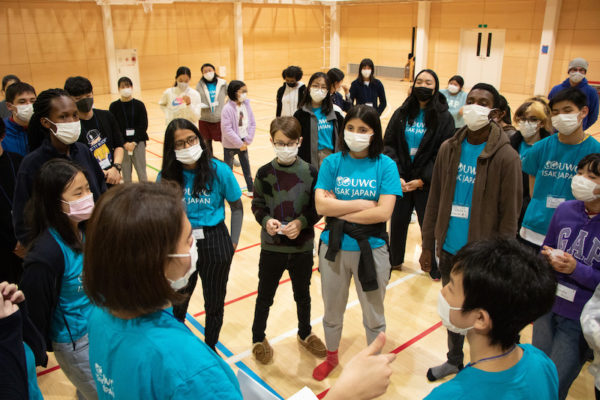
Project Quandeel was born as a CAS (Creativity, Activity, and Service) project when Mehrimo and Christine were in grade 11. The CAS project coordinator Mr. Hinton, Mrs. Hasham (History, TOK, Humanities), and Ms. Lin Kobayashi (UWC ISAK Japan’s co-founder), gave the duo the right guidance to lead the project through all its ups and downs and supported them when they needed encouragement.
Mehrimo volunteered for Winter School 2020 and met with UWC ISAK’s Short Programs Director Iris van der Heijden. The encounter inspired Mehrimo to create a summer camp out of Project Quandeel. “That’s what made us known by the greater public. That’s when we appeared on TV,” says Mehrimo.
Rocky roads to success
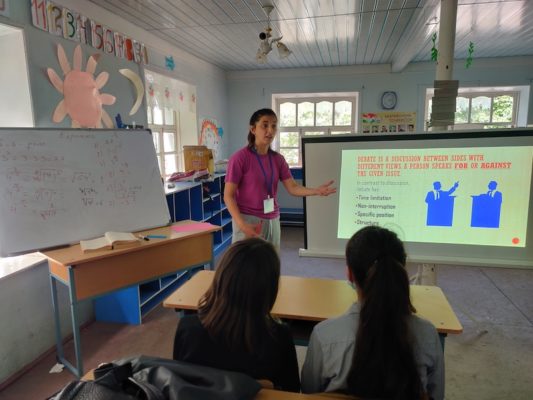 When the project began to take shape in grade 11, it initially had quite a few members, but they soon became discouraged. “Tajikistan was too far, and Covid-19 made everything uncertain and complex,” says Mehrimo. Nevertheless, things eventually coalesced around three core members: Mehrimo, Christine, and Hasan (Libya / Class of 2021). In fact, the name “Quandeel” is a combination of the word lantern in the three native languages of this core group: Urdu, Persian, and Arabic.
When the project began to take shape in grade 11, it initially had quite a few members, but they soon became discouraged. “Tajikistan was too far, and Covid-19 made everything uncertain and complex,” says Mehrimo. Nevertheless, things eventually coalesced around three core members: Mehrimo, Christine, and Hasan (Libya / Class of 2021). In fact, the name “Quandeel” is a combination of the word lantern in the three native languages of this core group: Urdu, Persian, and Arabic.
Quandeel’s mission is to be a lantern to light a brighter future for Tajikistani youth. In our efforts to design a program like ours in the face of a pandemic, we also aim to be a source of encouragement for students in areas like the border of the now Taliban-led Afghanistan. They have limited access to the Internet while busy with IB school. Due to the political situation and pandemic-related uncertainty, many parents forbade their children last minute to join Project Qandeel 2021 Summer School.
To make her project possible and accessible to the broadest diversity of students, Mehrimo and Christine looked for money everywhere they could. They received a UWC GoMakeADifference grant and got most of their funding from individual donors in the US, contacted by one of her mentors at a summer school she attended in India. The same donors are already on board for the next edition!
How to make an impact in Tajikistan today

In ten years, Mehrimo sees herself back in Tajikistan as an influential environmental scientist. Next to the brain drain that motivated her to build Project Quandeel, her main concern is the ecological crisis. The country is already in conflict with its neighbor, Kyrgyzstan, regarding water resources. And this will only get worse in the coming years. 60% of Central Asia’s water resources come from Tajikistan’s glaciers, of which a thousand have already disappeared over the past 30 years.
In addition to being the most ecologically threatened country in Central Asia, Tajikistan is also its poorest country. Moreover, the region is one of the most unstable globally and regularly faces profound political issues.
“If I don’t do this, who will?” Mehrimo says with her trademark smile and optimism. Even at this young age, she is already a changemaker.
